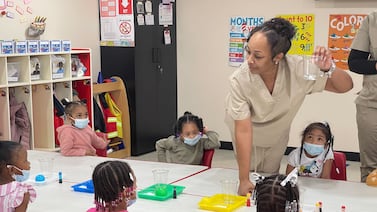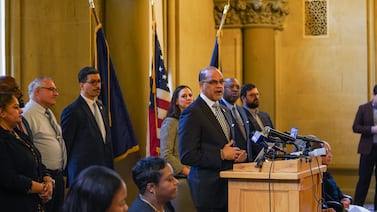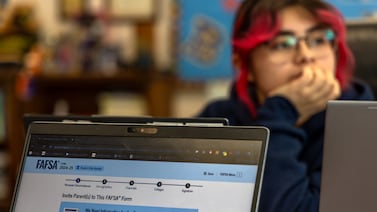Sign up for Chalkbeat Tennessee’s free daily newsletter to keep up with Memphis-Shelby County Schools and statewide education policy.
When the top three candidates for superintendent of Memphis-Shelby County Schools make their final cases to community and board members later this week, they will not only be explaining their leadership and academic successes, but also proving how well they can get to know a new community.
The school board’s current attempt at a national search for superintendent has produced three out-of-state finalists, positioning the district to have its first leader from outside Memphis in more than a decade. While new-to-town leaders have helmed Memphis public schools in the past, internal candidates have been favored in the last decade.
Being considered for the role are Yolonda Brown of Atlanta Public Schools, Marie Feagins of Detroit Public Schools Community District, and Cheryl Proctor of Portland Public Schools in Oregon.
Now in its second year and on its second round of candidates, Memphis’ search process for a successor to former Superintendent Joris Ray has been long and winding. It buckled last spring as board and community members disputed interim Superintendent Toni Williams’ eligibility for the role. But now, almost a year later with a smoother search process underway, some Memphians have wondered why a local candidate isn’t in the mix.
“There’s a lot of reason for the community and the educators to be wary of anyone coming in” after such a long process, said Rachel S. White, an assistant professor of educational leadership and policy at the University of Tennessee-Knoxville. Community members and educators could wonder how long a new leader may stay, why they want to be here in the first place, or how to build trust.
The school board can drive a successful transition for the new leader they select with support, resources, and patience, White said. That could look like a contract with clear evaluation expectations and more than a year to execute changes, plus mentorship by another superintendent.
Whoever emerges as the next leader has a challenging job: Like other public school districts, Memphis is projecting a large budget gap as federal pandemic relief funds expire, leaving leaders to decide which academic programs and personnel they can afford to cut or keep. Plus, the current administration has launched a major facilities overhaul that could involve school consolidations and closures.
The new leader will also have to deal with direct challenges to local control from state leaders and lawmakers, who have stepped up the pressure on public school systems. New policies from the GOP-led state government include restrictions on classroom instruction, changes to school evaluation criteria, and an expansion of private school vouchers.
White’s research suggests that contentious political environments in education are responsible for a growing proportion of superintendent departures in recent years. White, a former school board member, has studied the superintendent position as the founder and director of The Superintendent Lab.
Become a Chalkbeat sponsor
Superintendents “don’t get in this job to be politicians, and to manage politics of communities and boards,” White said. “They get into this job because they want to serve kids.”
National data also show an increase of new-to-the-job superintendents, White said. None of the three finalists for the Memphis role have been superintendents before.
The final round of interviews in Memphis includes a public meet-and-greet on Thursday evening, plus a two-hour long interview with the school board for each finalist during the day on Friday. Community organizations will also meet with the candidates in private sessions, according to the school district.
School board members are expected to vote on a final candidate by the end of February, said co-chair of the search Joyce Dorse-Coleman, but no date has been set yet. The finalist will need support from at least six of the school board’s nine members to become superintendent. The new leader will start by July 1, and is expected to receive support transitioning into the new role from current interim Superintendent Williams, whose contract allows her to return to her former role as finance chief or stay on as a consultant.
Dorse-Coleman and search co-chair Stephanie Love said the tortuous search process has been worth it.
“We have had hiccups along the way, speed bumps along the way,” Love said, “but I am happy with the way it’s going now.”
Having three newcomers has ushered in renewed calls from some community members and educators for a candidate with local expertise. At a recent board meeting, Southwind High School Principal John Bush said he represented Memphis’ principals association in making a plea for a “candidate who has worked and lived in this community.”
Sarah Carpenter, a vocal education advocate who is the executive director for parent group Memphis Lift, said she’ll be watching to see how the finalists can support Memphis’ Black and Hispanic students. But she trusts that one of the three finalists can do the job.
Carpenter said, “We asked for a national search, we got it, and they can’t mess it up this time.”
Laura Testino covers Memphis-Shelby County Schools for Chalkbeat Tennessee. Reach Laura at LTestino@chalkbeat.org.






